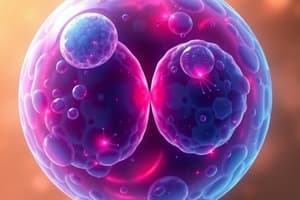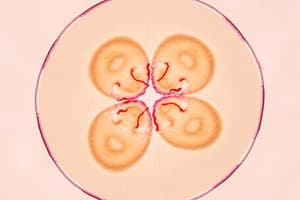Podcast
Questions and Answers
What is the primary purpose of gametogenesis?
What is the primary purpose of gametogenesis?
- To enhance cellular repair mechanisms
- To produce identical diploid cells
- To facilitate asexual reproduction
- To create genetic diversity in sex cells (correct)
How many gametes are produced during oogenesis?
How many gametes are produced during oogenesis?
- 3 functional egg cells
- 4 functional egg cells
- 1 functional egg cell and 3 polar bodies (correct)
- 2 egg cells and 2 polar bodies
What occurs during prophase I of meiosis in gametogenesis?
What occurs during prophase I of meiosis in gametogenesis?
- Gametes are formed
- Homologous chromosomes undergo crossing over (correct)
- DNA replication takes place
- The chromosome number is halved
What is the result of the second meiotic division?
What is the result of the second meiotic division?
What restores the diploid number of chromosomes during reproduction?
What restores the diploid number of chromosomes during reproduction?
What is the main purpose of mitosis?
What is the main purpose of mitosis?
Which phase of mitosis involves the alignment of chromosomes at the cell equator?
Which phase of mitosis involves the alignment of chromosomes at the cell equator?
How do plant cells differ from animal cells during the process of cytokinesis?
How do plant cells differ from animal cells during the process of cytokinesis?
What results from a complete round of mitosis?
What results from a complete round of mitosis?
In which phase do chromosomes split and move to opposite sides of the cell?
In which phase do chromosomes split and move to opposite sides of the cell?
What happens during the telophase of mitosis?
What happens during the telophase of mitosis?
What type of cell division is cancer associated with?
What type of cell division is cancer associated with?
Which of the following correctly describes homologous chromosomes?
Which of the following correctly describes homologous chromosomes?
Flashcards
Mitosis
Mitosis
A type of asexual reproduction where a parent cell divides into two genetically identical daughter cells.
Interphase
Interphase
The stage in the cell cycle where the cell performs its normal functions and grows.
Prophase
Prophase
The phase where chromosomes condense, the nuclear envelope breaks down, and spindle fibers form.
Metaphase
Metaphase
Signup and view all the flashcards
Anaphase
Anaphase
Signup and view all the flashcards
Telophase
Telophase
Signup and view all the flashcards
Cytokinesis
Cytokinesis
Signup and view all the flashcards
Binary Fission
Binary Fission
Signup and view all the flashcards
Gametogenesis
Gametogenesis
Signup and view all the flashcards
Spermatogenesis
Spermatogenesis
Signup and view all the flashcards
Oogenesis
Oogenesis
Signup and view all the flashcards
Crossing Over
Crossing Over
Signup and view all the flashcards
Fertilization
Fertilization
Signup and view all the flashcards
Study Notes
Mitosis
-
Mitosis is a form of asexual reproduction where a parent cell divides to create two identical daughter cells.
-
The result is two genetically identical daughter cells.
-
The purpose is for repair and growth; in single-celled organisms, it is the only method of reproduction.
-
The process involves the stages: Interphase, Prophase, Metaphase, Anaphase, Telophase, and Cytokinesis.
-
Interphase: Daily cell functions, DNA replicates, and condenses.
-
Prophase: Chromosomes condense, centrioles move to poles, nuclear membrane breaks down.
-
Metaphase: Chromosomes align at the cell's equator, spindle fibers attach to centromeres.
-
Anaphase: Chromosomes separate and are pulled to opposite poles, cell elongates.
-
Telophase: Chromosomes decondense, new nuclear membranes form, cell begins to pinch.
-
Cytokinesis: Cell completely divides into two new cells.
-
Plant vs. Animal Cells: Plant cells form a cell plate between daughter cells that develops into new cell walls, while animal cells pinch.
-
DNA Replication: Copying of DNA.
-
Somatic Cells: Body cells (e.g., liver, skin, nerve, bone, blood).
-
Cancer: Uncontrolled cell division.
-
Homologous Chromosomes: Chromosome pairs with similar size, shape, and genes.
-
Genes: Sections of DNA code for specific proteins.
Other Asexual Reproduction Methods
- Sporulation: Mold and fungi produce spores that develop into new organisms.
- Vegetative Propagation: Runners, corms, and bulbs reproduce through mitosis.
- Binary Fission: Bacterial reproduction, one cell splits into two.
- Budding: New organisms grow from the parent organism (e.g., hydra, sponges).
Meiosis
- Meiosis is a form of sexual reproduction, creating gametes (sex cells).
- The result is four genetically different haploid sex cells (sperm or egg).
- The purpose is to create genetic diversity and produce sex cells.
- The process involves interphase, two rounds of division (meiosis I and meiosis II).
- Meiosis I: Homologous chromosomes pair up, exchange genetic material (crossing over), then separate.
- Meiosis II: Sister chromatids separate, final division, resulting in four haploid cells.
Gametogenesis
- Spermatogenesis: Produces four sperm cells at a time.
- Oogenesis: Produces one egg cell and three polar bodies.
- Fertilization: The joining of sperm and egg to restore the diploid chromosome number.
Studying That Suits You
Use AI to generate personalized quizzes and flashcards to suit your learning preferences.




